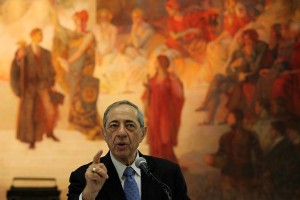For Mario Cuomo, No Shunning of Tension Between Faith and Politics
< < Go Back
“It’s always been safer not to talk about religious beliefs because religious beliefs are so personal that they tend to antagonize,” Mario M. Cuomo once cautioned. Never one to dodge a debate, though, he predictably, and dramatically, rejected his own advice and tackled the issue.
Like few other elected officials, Mr. Cuomo sought publicly to reconcile his belief in the God of his own Roman Catholic Church with his progressive political agenda, while challenging religious leaders and other public figures who claimed a monopoly on morals.
Who else but Mario Cuomo, then serving a third term as the governor of New York, would take the bait when the essayist Roger Rosenblatt invited him to join a panel discussion at the 92nd Street Y in 1991 to ponder the question of “Who Is God?” — and, more specifically, to reveal whether God confided in politicians.
Delivering an eloquent 15-minute soliloquy with a preacher’s cadence, Mr. Cuomo revealed as much about himself — an ordinary New Yorker from the “asphalt streets and stickball” of Queens who “struggles to keep a belief in God that he has inherited, a Catholic raised in a religion closer to the peasant roots of the simple Sunday mass practitioners than to the high intellectual traditions of the Talmudic scholars, the elegant Episcopalian homilists or abstruse Jesuits teachers” — as he did about God.
Mr. Cuomo recounted growing up in Jamaica, Queens, among the poor and the wounded, in a neighborhood where a famous ex-jockey-turned-alcoholic froze to death one winter while sleeping in a crate across from St. Monica’s Church.
“It was hard to see God’s goodness in the pathetic faces of the customers in our small grocery store pleading with my father for bread and maybe some cold cuts just until the next relief check comes, ‘Andrew please,’ ” Mr. Cuomo recalled.
But through all the tribulations, the Depression, World War II, the Vietnam War, the ’60s, when Americans were asking not “Who is God?” but whether God even existed, Mr. Cuomo said, they still needed “something larger than ourselves to believe in” and that “in the end, to make sense, it must be a god of love..”
Mr. Cuomo began speaking out in earnest about religion and politics in 1984 after blaming the Catholic Church for defeating his proposal for a state equal rights amendment for women and after John J. O’Connor, the archbishop of New York, said he did not “see how a Catholic in good conscience can vote for a candidate who explicitly supports abortion.”
Mr. Cuomo said that though he personally opposed abortion, it was guaranteed by the Constitution, which he was sworn to uphold. He also denounced politicians who opposed abortion but supported the death penalty, and derided what he viewed as a new ethic in which “God helps those whom God has helped.”
Moreover, he asked at the University of Notre Dame in 1984, “When should I argue to make my religious value your morality?”
At the 92nd Street Y, his fellow panelists were Ari L. Goldman, a New York Times reporter who wrote “The Search for God at Harvard,” and Madeleine L’Engle, author of the children’s book “A Wrinkle in Time.”
“Who is God?” Mr. Cuomo asked, and then answered himself: “He is a voice urging us to be involved in actively working to improve the world that he created every way possible including through government because it is a world he loves so much that he made man to enjoy it. … “That’s a useful consolation for any of us,” Mr. Cuomo concluded, “and especially for a politician from Queens still struggling to believe.”
More From The New York Times:




